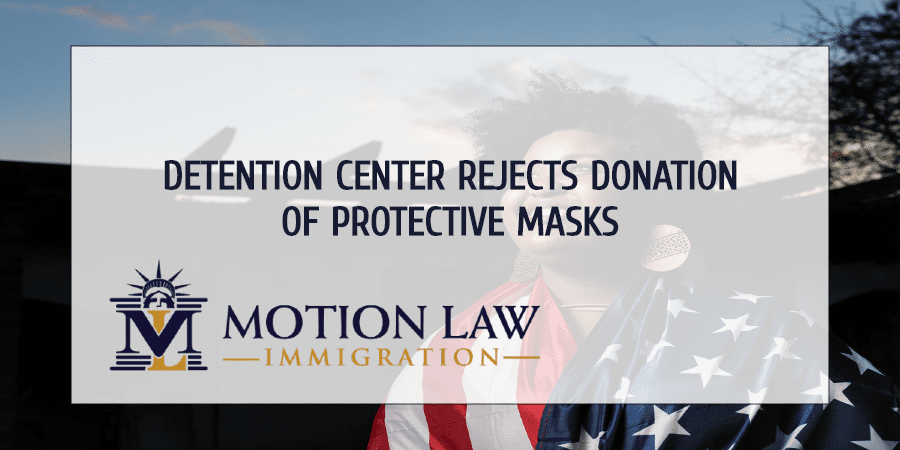Detention center rejects donation of protective masks

The risky situation in immigration detention centers
Since the Coronavirus’ outbreak in the US, immigrant rights advocates have complained about the danger in detention centers.
As recommended by the World Health Organization (WHO), the best prevention to avoid the massive spread of COVID-19 is to have social distancing.
The reason why the WHO recommends social distancing is because the virus spreads uncontrollably fast and there is no cure yet.
However, immigration detention centers are known for being overcrowded and not having enough space to house all detainees or asylum/refuge seekers.
This is an alarming situation for the country because these centers could easily become hotbeds of the virus.
The number of people infected with COVID-19 in immigration detention centers is increasing every day, growing exponentially and it is truly concerning.
Therefore, hundreds of immigrant rights advocates have come together to make donations to multiple detention centers and thus help prevent a massive outbreak within these government facilities.
Donation to Detention Center in San Diego
Immigrant rights advocates try to find different solutions because they do not have enough resources and tools to help detained families during the health crisis.
Therefore, they decided to buy masks and hand sanitizers to donate to the detention centers.
On Friday, April 24, several activists went to the Otay Mesa Detention Center (OMDC), located in San Diego.
They wanted to donate around 1,000 masks to protect detained immigrants so they can have a decent and safe place to live while they wait for a response regarding their immigration cases.
However, employees of the Immigration and Customs Enforcement Service (ICE) did not accept the donation, arguing that they do not have approval to receive the masks.
The Advocates’ Response
One of the advocates who was present on the day of the donation claimed: “It is rare that I feel so powerless to change something in my community and my district (…) They are human beings, we do not have massive deaths, but we know where this is going.”
They expressed the helplessness they felt for wanting to help save as many lives as possible and not being able to.
Furthermore, they argue that if it were not an immigration detention center, most of the community and even the government would be trying to help detainees with a sense of urgency, however, because they are immigrants, nobody cares about them.
Advocates invite the entire population and the current government to recognize the imminent danger for thousands of innocent families who just want a better future in the US.
ICE’s response
The Immigration and Customs Enforcement Service (ICE) rejected the donation arguing that “all detainees at OMDC have the appropriate personal protective equipment to maintain their safety while they are detained in ICE custody” and that they are checking the “ability to accept and use these donated face coverings.”
In addition to that, one of the ICE representatives mentioned: “Currently, we are also reviewing the proper procedures to ensure that any donated equipment provides the appropriate level of protection and contributes to the safety, health and well-being of individuals in custody of ICE.”
However, the longer we wait, the greater the risk and it could be too late for detained immigrants with greater vulnerability to the virus.
A possible solution
Government entities should constantly review current figures to make the best decisions and protect detained immigrants and federal employees.
The government must provide medical support, access to necessary treatments and medications to avoid a massive contagion in immigration detention centers.
It is important, during these times of global crisis, to handle any immigration case cautiously and be meticulous in preparing the necessary documentation.
If you have any questions about an immigration issue or relating to a case you may have currently in progress, then please don’t hesitate to contact us for a FREE Phone Consultation with one of our expert immigration attorneys.
Simply call Motion Law today at: (202) 918-1799.